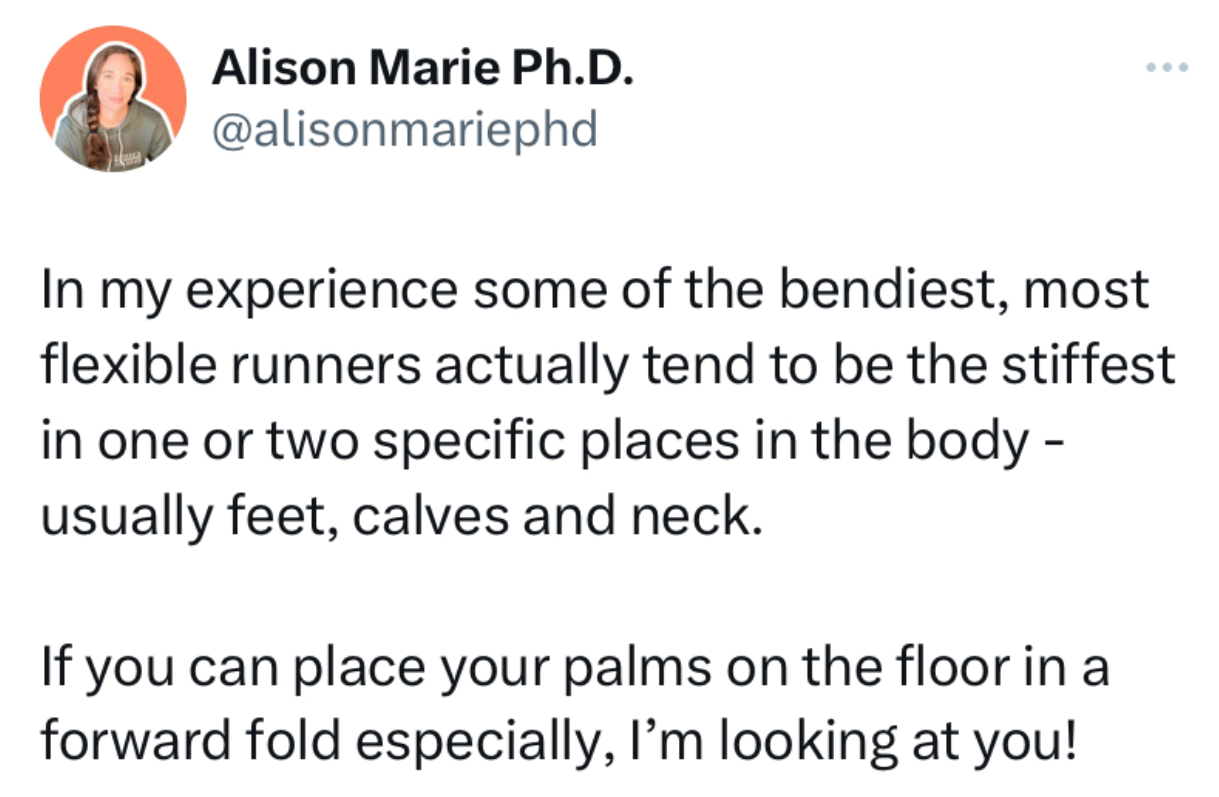
Stiffness, Stability, and Safety: Understanding Chronic Tightness and How to Fix It
May 23, 2023Is This You?
After posting this I received many comments saying:
“Thats me.”, “I feel seen”, “Yes, help!" "No matter how much I stretch my muscles are always tight" So let's expand on this.
When looking at chronic tightness we first have to look at our body's needs. The body needs stiffness, stability, and safety (all 3 plus awareness of the body in space). Being loose somewhere (hips, pelvis) might cause you to grip somewhere else (feet) to create that safety.
What that means is stretching often isn’t the answer. When stretching doesn’t bring lasting relief, it likely means we need to create “good” tension somewhere else to be able to release where we are feeling the tension chronically.
What Does That Mean?
Sometimes to truly release tension in one part of your body we need to create tension somewhere else. When the body has that tension (safety) it’s craving, it can finally let go of the chronic muscle tightness you are experiencing. Before I dive into a few specific exercises/strategies below, I want to clarify one thing:
While more mobility isn't better, being able to palm the floor isn’t necessarily a bad thing. You aren’t broken if you are bendy. However, with more mobility comes the need to be strategic in creating strength/stiffness/tension in your body where/when you need it!
So Now What?
Build safety, stiffness, and stability where you need it - connect with proximal hamstrings, learn to truly exhale, and find your deep abs. Learn to let go where you are creating that extra safety - connect with the ground through true pronation, learn to inhale 360 degrees into your ribcage, and find length in the glutes/posterior pelvic floor. You’ll have a hard time trying to make progress in one without also making progress in the other.
Try These Four Exercises to Put These Ideas Into Practice:
T-Spine Rotation with Wall Reference
Create some tension/stability at your pelvis so that you can really breathe/move through your whole rib cage.
Set up in the All 4s position with the balls of your feet on the wall. Stack your shoulders over your hands and ground into your hands without locking out your elbows. Pull up on the balls of your feet to engage the hamstrings and stabilize the pelvis. This way the motion will come through the spine/rib cage only. Exhale reach through, hold, and breathe. Exhale, open back out to the side, hold, and breathe. Continue moving with your breath. If you want to learn more about breathing check out this article I have on its importance for our running.
Heel Rocker Standing Pronation Drill
Feel your feet connecting with the ground.
Place a small sock under the arch just in front of your inside heel. Slowly soften at the knee to move your weight forward, don't force it through your hips to lean forward from above. Feel the weight travel to your inside/front heel. Move back by straightening the knee while you focus on feeling heavy in the outside heel. Keep the movement small, going from your outside/back to your inside/front heel.
Slouchy Squats
Learn to use that connection with the ground to distribute force through the body to stand up.
Stand ON one leg with the other as a kickstand behind you. Make sure you are on the leg, not popping your hip out to the side or leaning over from the top. Shift that hip back in space and think knee over toes, sternum, and nose over the knee. Bend the knee forward over your midfoot. From there slouch over that leg as you slowly sink down into a squat. Press through the foot to stand back up, keeping that knee bent over the midfoot all the way through the top.
Overcoming Hinge Iso
Create tension in the system so that you can truly let go of your glutes/posterior pelvic floor. The foot grounding above is really important here too!
Take a long towel folded lengthwise or a yoga strap and stand on it with your feet hip-width apart. Make sure that you have the towel flat under your feet and not bunched up so that you can maintain good foot contact. Hold each end of the towel in your hands. Bend your knees forward to load your midfoot (very important, don’t lose this as you move into the hinge position!). Then shift your hips back in space, lengthening through your backside. Pull up gently on the towel to create some tension. Exhale, long and full. Low ribs come down and in (without crunching down from the top, the chest stays lifted).
Inhale as you imagine spreading your sits bones apart, creating space in your backside.
Remember:
When the body has the tension (safety) it craves, it can finally let go of the chronic tightness it is holding. If you are thinking, I’m not bendy at all, this doesn’t apply to me, all the strategies but the last one could still be very helpful for you, too. You might just use a different isometric strategy (called yielding isometrics) to allow your body to soften into those ranges instead of creating more overall stiffness.
In my Women’s Running Academy (Mentorship), we dig deep like this into your body to understand why it feels/moves the way it does. We provide the support it needs, where YOU need it so that you can run and move more efficiently.
Don't miss a thing!
Join my newsletter, be the first to know about what's coming up, and get even more great content!


